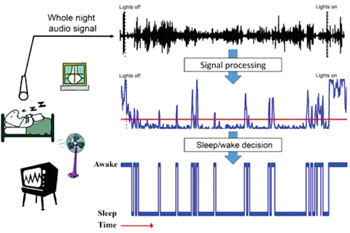New System May Enable at-Home Testing for Sleep Disorders
By LabMedica International staff writers
Posted on 07 Oct 2015
Sleep analysis experts have developed a noninvasive system based on audio recordings for breath sound analysis (BSA) that may help simplify diagnosis of sleep disorders such as obstructive sleep apnea (OSA), at far more convenience and lower cost than polysomnography (PSG), resulting in increased willingness for patients to undergo testing.Posted on 07 Oct 2015
"We’ve developed a non-contact, BSA algorithm that provides a reliable estimation of whole-night sleep evaluation for detection of sleep quality, snoring severity, and OSA. It has the potential to reduce the cost and management of sleep disorders,” said study leader Yaniv Zigel, PhD, Dept. Biomedical Engineering, Ben Gurion University (Be'er Sheva, Israel).

Caption: Portrayal of the simple, noninvasive new system that tests for sleep disorders based on whole-night audio recordings for breath sound analysis (BSA)—far more convenient and lower cost than polysomnography (PSG), with potential to be performed at the patient’s home (Image courtesy of Ben Gurion University).
PSG requires a full night sleep-center stay and patients are connected to numerous electrodes and sensors to acquire signals and data from electroencephalography (EEG), electrooculography (EOG), electromyography (EMG), and electrocardiography (ECG) tests. The data is processed and visually examined or mathematically transformed manually in order to reveal insights about sleep/wake states and many aspects of physiology. “This procedure is time-consuming, tedious, and costly due to complexity and the need for technical expertise; the market is begging for a better solution,” said first author Eliran Dafna, BGU PhD student.
In the design and validation studies, whole-night breathing sounds were measured from 150 patients using both ambient microphones and PSG simultaneously. The system was trained in a design study on 80 subjects and a validation study was blindly performed on the additional 70 subjects. A set of acoustic features quantifying breathing patterns was developed to distinguish between sleep and wake segments. Sleep quality parameters were calculated based on the sleep/wake classifications and compared with PSG for validity.
When comparing sleep quality parameters, there were only minor average differences between PSG and BSA. Measuring 150,000 individual time segments (epochs), the BSA epoch-by-epoch accuracy rate for the validation study was 83.3% with 92.2% sensitivity measuring sleep-as-sleep, specificity of 56.6% for awake-as-awake, and Cohen's kappa of 0.508.
“The results showed that sleep/wake activity and sleep quality parameters can be reliably estimated solely using BSA,” said coauthor and sleep expert Prof. Ariel Tarasiuk, of BGU and Soroka University Medical Center (Be'er Sheva, Israel). “This study highlights the potential of this innovative approach to measure sleep in research and clinical circumstances. Clearly, the transition of this technology to at-home sleep evaluation depends on third-party reimbursements for the use of home-study equipment.”
The study, by Dafna E et al., was published February 24, 2015, in the journal PLOS ONE.
Related Links:
Ben Gurion University













